- Home
- Megan Shepherd
A Cold Legacy Page 6
A Cold Legacy Read online
Page 6
Suddenly, I realized I wasn’t saving the sheep anymore.
I was just as stuck as it was.
Panic made my pulse race. I let go of the sheep and grabbed onto the tree branch, but it wasn’t attached to anything, and I only got stuck further in the muck. The sheep bleated frantically, frightened by my movements, and I sank deeper.
The sun set on the horizon.
I was going to die out here.
I screamed as loudly as I could until my voice was hoarse, until I could see only the horizon in the faint light, until the sheep gave up struggling.
Until a figure appeared on the horizon, as unreal in the twilight as a ghost.
SEVEN
IT WASN’T UNTIL THE figure came closer, walking expertly over the moors, that moonlight splashed over it and I recognized the face beneath the hooded cloak.
“Elizabeth!” I screamed.
She approached quickly but carefully, as though she’d spent her entire life learning how to navigate the hidden dangers of a bog—which I suppose she had. She wore a long brown cloak and a traveling gown, stained now with black peat. I didn’t notice the rifle in her hand until she was only feet away.
“Stop moving!” she called. “It only makes it worse.”
She lay down on the ground and held out the rifle. “Grab hold and don’t move. I’ll pull you in, but we must go slow.”
I curled my fingers on the rifle, heart pounding, fighting the instinct to kick as hard as I could. Inch by inch, she pulled the rifle toward her, giving the mud time to shift and release me. My heavy skirts caught on roots deep in the muddy waters. No matter how she pulled, she couldn’t tear me free.
“Your dress is caught,” she said. “You’ll have to take it off.”
I started on the row of buttons down the front of my dress with stiff fingers. Once I struggled out of it, the cold water bit at my skin through my underclothes, but I felt lighter, freer, and it didn’t take Elizabeth long to drag me to the bog’s edge and pull me from the water. I was slick with mud and shivering uncontrollably. She wrapped her cloak around me as I huddled on the ground, breathing in her rosewater scent.
“My God, Elizabeth, I nearly drowned. . . .”
A shot rang out, and I jerked up with a cry.
The smell of burned gunpowder hung in the air. She’d shot the sheep to put it out of its misery. The poor animal sank into the bog, a part of the moors now.
She wiped the muck from my face. “I heard your screams from the road. Why are you out here alone?”
“I went to Quick for a wedding dress. God, it seems so stupid now. I heard the sheep—”
“Oh, you foolish girl. My carriage is waiting back at the road. Thank goodness I was held up in Liverpool or I’d have missed you completely. Let’s get you home before you freeze to death. Valentina knows which herbs to use in a bath to restore circulation.” She wrapped an arm around my shoulders and led me along the winding bog paths. It was dark now, clouds hiding the moon, steam rising from the horse’s nostrils. She helped me into the carriage.
I sank into the soft seats. “I’d have died if you hadn’t come just now.”
She leaned forward and rubbed my knee. “We von Steins pride ourselves on good timing.”
“Did you discover what the police know? Are they still after us? I read an article that John Radcliffe wrote about the massacre, and it made no mention of us.”
She rubbed my freezing hands in hers. “Right now you need to worry about getting warm, not the police. They won’t be storming the house tonight, I can promise that.” There was a troubled look on her face, though, and she pressed a hand against her coat, retucking a folded piece of paper that had nearly slipped out of her pocket.
We heard Lucy’s and Montgomery’s voices calling to us a quarter mile away, but it was Balthazar who reached us first. He flung open the carriage door and wrapped his arms around me. Montgomery raced up just behind him.
“Juliet, what happened?”
I couldn’t answer. I was shivering too hard.
Montgomery touched my hair, my face, my hands, as though reassuring himself I was intact. There might have been tension between us, but he still loved me.
“Balthazar, my friend,” he said, “carry her back to the manor, quick as you can.”
I hadn’t the strength to object when Balthazar scooped me up, carrying me toward the shining lights. Once inside the house, Mrs. McKenna fawned over me, wrapping me in a blanket and rambling about getting some tea and scones in my stomach. She led me upstairs, where Valentina already had an herbal bath going. Mrs. McKenna helped me strip off my ruined undergarments and ease into the hot water.
“Mrs. McKenna, I can’t thank you enough.”
“Enough of those formalities, little mouse. You nearly died tonight. Call me McKenna like everyone else does.”
The water quickly browned, but I didn’t care. I held my breath and slipped under, letting the water work its way through my hair, daring to imagine that it was bog-water instead of a rose-scented bath. What if I had died, tonight? It was Edward we were all so worried about, but the truth was, the world wasn’t a safe place. Any one of us could vanish from it at any moment.
I jerked upright, coughing out water. Once my head had cleared, I saw that McKenna had left. Elizabeth was in her place at the side of the tub, still in her stained traveling dress, while Valentina packed away the herbs she had brought for my bath.
Elizabeth reached out to pet my head.
“Silly girl. You must take better care of yourself. People will be relying on your judgment. You can’t take foolish risks like that if you’re to run this place one day.”
I twisted to look at her in surprise. Valentina, crouched down to pick up some of her fallen herbs, had paused as well. “What do you mean, run this place?” I asked.
Elizabeth glanced at Valentina hesitantly. There was regret on her face, as though she wished she could take back what she’d said. “Valentina, could you leave us a moment? Afterward, let’s talk, you and I.”
Valentina stared at Elizabeth, some silent exchange happening between them that I could not fathom the meaning of, and gathered the rest of the herbs and hurried from the room.
Once we were alone, Elizabeth took a deep breath. “Juliet, the professor and I intended to make you our heir.”
My hands nearly slipped on the wet side of the tub. “A ward, yes. But heir?”
“Yes. Heir to all of it. The manor. The grounds. Everything we have.”
A tin clattered to the floor outside the bathroom, followed by the sound of footsteps running away. Valentina had been listening in the hallway. I started to call after her but Elizabeth shook her head. “Don’t. I expect she’ll be quite upset. I shouldn’t have told you in front of her—I wasn’t thinking, and it was cruel of me. Before I left for London, Valentina and I had begun to discuss her taking over one day, if I didn’t find a suitable heir in the next few years. But then I discovered the professor had taken you in, and that we’re even distantly related.” She gave me a kind smile. “Valentina always knew there was a possibility of long-lost family showing up. She’ll be disappointed, but there will always be a place for her here, don’t fear.”
Valentina was the least of my worries. Heir to Ballentyne? It was enough to make my head spin. “But what about Hensley? He’s your own son; surely he should inherit it.”
A strange look crossed her face. “Hensley—yes. I should have realized you’d meet him. Unfortunately Hensley will never be suited to manage an estate of this size. He has a defect of the brain.”
“Oh, how awful. Is that why you didn’t tell us about him? Who . . .” I paused. “Who is the father?” It was hardly a polite question, but women like Elizabeth and me had never danced around propriety.
“An American novelist. I went overseas to visit family in eighty-nine and met him. The father doesn’t know, which is just as well.” She let out a sigh, running her fingers along the towel. “He wasn’t a very good nove
list.”
It felt good to smile, after everything that had happened.
“Well,” she said. “It’s not every day one narrowly escapes death. Dry off, and give me a moment to speak with Valentina. Then we shall have a proper talk.”
WHEN I’D FINALLY SCRUBBED every inch of the bog from under my fingernails and between my toes, I found Elizabeth, Montgomery, and Lucy in the second floor library, seated around the fireplace, chatting in low voices. There was no sign of Valentina—I imagined she was in her room, trying to get over the sting of losing the inheritance. Hensley sat by Elizabeth’s feet. I was surprised he was still awake since it had to be past midnight, but he hadn’t seen his mother in months and must miss her terribly. It made me even more curious about his brain defect, and if it had to do with his miscolored eye. Elizabeth stroked his hair absently. In turn, he stroked the fur of his pet rat.
My robe rustled as I entered, and Elizabeth gave her crooked smile. “Feeling better?”
“Yes—well, I think so.” I glanced toward Hensley, not sure such young ears should overhear talk of near death and police chases and murder, but he played with his rat silently, ignoring us. “I’m much more worried about what’s on that paper you’re trying to keep hidden in your coat.”
Lucy and Montgomery sat straighter. Elizabeth raised an eyebrow and took out the paper. “You’re nothing if not observant, Juliet. I suppose you’d have found out sooner or later.” The paper was crumpled and worn, too thick for a letter and the wrong shape. As she unfolded it with her elegant hands, my heart shot to my throat. I knew that lettering across the top.
“A special memorandum poster,” she said regretfully. “The kind advertising rewards for escaped criminals and fugitives. In this case, I am dearly sorry to say, it’s for you. The police haven’t given up the search.”
She handed me the paper, which I scanned in one glance. Lucy jumped up to read over my shoulder. My own face looked back at me, an inky portrait done by a police artist who had never seen me. They’d captured my eyes but the jaw was too wide, the brow too heavy, making me look like a degenerate.
I started to feel light-headed. Montgomery took the poster from me. “One thousand pound reward,” he read, “for information leading to the capture of Juliet Moreau of London, wanted for murder. Age: Seventeen. Last known residence: Dumbarton Oaks . . .”
The rest of his words faded as my head started throbbing. Lucy put her hands on my shoulders, shaking me back into reason, but it was all I could do to keep breathing.
“This is impossible,” Montgomery said, his voice on edge. “They’ve no way to prove Juliet was responsible for those deaths.”
Even though I was.
Lucy had gone white. “It was my father, wasn’t it? He told the police.”
“No, it wasn’t him.” I answered in a rush, relieved at least to put her worries to rest. I took out the article and handed it to her. “I found this newspaper article in Quick. He denounces his role in the King’s Club and talks about how sad he is you disappeared. He doesn’t blame us for what happened, at least not publicly.”
Lucy clutched at the newspaper. “He’s worried about me?” She sank into the chair, poring over every word of the article.
Elizabeth sighed. “Inspector Newcastle was the one who told the police, I’m afraid. He was taken to the hospital with fatal burns. He died within hours, but not before he recounted what had happened. You killed some very important men, Juliet. Someone associated with them is scouring the country for you, but it doesn’t matter. They won’t find you as long as you stay hidden here. The police don’t know the location of this manor, and don’t even know it’s in my family. It’s under the name of a distant cousin in Germany. It would take them years to go through the paperwork, and they wouldn’t even know to look for it.”
Elizabeth reached for a bottle of gin on the side table, pouring each of us a glass, but Lucy waved it away, and so did Montgomery. He stood, tucking the poster into his pocket. “I’m going to show this to Balthazar, but I’d prefer to keep it hidden from the rest of the staff. It’s best they don’t know our pasts.”
He strode out of the room.
Elizabeth drank the gin he’d left behind, and then Lucy’s, too. “I know it’s a terrible shock,” she said, “but I assure you that you’re quite safe here. It seems our more pressing concern is Mr. Prince’s health. McKenna told me he’s still alive, in and out of consciousness, which is a miracle itself. With the amount of arsenic he took, a normal man would be dead in days.”
“Yes, about Edward.” I exchanged a glance with Lucy and then dropped my voice. “There’s something rather pressing we must discuss. He had a moment of lucidity a few nights ago. He told Lucy and me that the Beast was caused by a disease in the brain and was curable if we could drain or transplant the diseased organ.” I knit my fingers as I explained the rest of what Edward had said and why we’d kept the information to ourselves.
“We thought with your advanced medical knowledge,” Lucy added, “there might be something you can do.” The light from the fire illuminated her desperation.
“I see.” Elizabeth was quiet, thinking, as the fire crackled and popped. Hensley crawled along the floor by Elizabeth’s feet, laying out bits of dried cheese for his rat. The rat tried to scurry away and Hensley grabbed it hard, hugging it to his chest, stroking it fiercely.
“Don’t run away,” he whispered. “It isn’t safe.”
Elizabeth murmured something in his ear about giving his pet some bread to calm it down, and Hensley relented and handed her the rat. She quickly slipped it into her pocket, which she buttoned closed, but I couldn’t help but notice the rat wasn’t moving. I dared not ask her about it now, though, with so much hanging in the balance for Edward.
Elizabeth let out a deep sigh.
“I can tell how hopeful you both are about this new development, but I’m afraid I shall have to be the bearer of bad news. Organ transplantations are possible, in some cases. I transplanted a liver, and I’ve heard of it done with lungs and kidneys, even a heart once—they kept the blood flowing during the procedure with artificial pumps. However, the brain is central to life. If the spinal column or cranial complex is severed or even badly damaged, death is immediate. There would be no way to perform a brain transplant on a living person. It’s a paradoxical situation, you see. The procedure might cure him, but he would have to be dead for us to perform it.”
The fire crackled more, as the hope slowly drained out of Lucy’s face. Her bottom lip started to tremble.
“I can make his days as pleasant and comfortable as possible,” Elizabeth said softly. “That’s all, I’m afraid. If he is to defeat the Beast, he will have to do it on his own.”
“But he isn’t strong enough on his own!” Lucy cried. She pushed off from the sofa, tears streaking down her face, and ran out of the room. I stood to go after her but stopped. What could I possibly say to her to make things better?
Elizabeth picked up a sleepy Hensley in her arms. It was hard to reconcile the two sides of her—I had always thought of her as a brilliant and cold surgeon, not unlike my father. Now I saw her as a mother, too.
I swallowed. “How do you do it?” I asked quietly. She cocked her head in question. I explained, “How do you ignore the voices in your head? The ones that won’t let you just be happy. The ones that want more out of life. More like what men are free to do—study what they want, go where they want, be who they want.”
Her smile was rather tight. She held up the glass as Hensley fell asleep on her shoulder. “I drown them in gin, but I’d be no kind of guardian if I recommended that.”
EIGHT
DAYS PASSED, AND EDWARD’S fever still didn’t break.
We moved about the manor like unquiet ghosts. McKenna tried to brighten our gloom with talk of the wedding. She sent the girls out to prune the flowering trees in the garden so the spring would be full of new growth, and prepared entrees for us to sample for the wedding feast, but it
was increasingly impossible to ignore the feverish moans coming from Edward’s room. Lucy attended to his bedside day and night.
“You’re going to make yourself sick,” I told her one morning. “Take a break. Let me watch him.”
“Your bedside manner is deplorable.” She tried unsuccessfully to feed him broth. “You’d poke and prod him so much, he’d never want to get better.”
She tried to feed him more broth, but he turned his head, eyes glassy and unfocused, and mumbled something incomprehensible. Sometimes he seemed to be aware of who we were, and in the next moment he’d push the bowl away and shudder.
“It’s getting worse,” she muttered, mopping up the spilled broth. “No matter what Elizabeth said, I can’t help but think . . .” Her voice trailed off as she caught sight of something over my shoulder. “Goodness, do you see that? It looks like the moors are on fire!”
I whirled toward the windows, where the blackness was broken by huge flames in the lower fields. I pressed my face against the glass.
“Montgomery!” I called. “Balthazar, hurry!”
They soon appeared, and I pointed beyond the window. “The fields are on fire,” I gasped. “Stay with Edward. I’ll find Elizabeth and warn her.” I turned to go.
“Juliet, wait.” Montgomery’s voice was steady and calm, almost light. “It’s just a bonfire. Look.”
I squinted into the darkness. He was right—it was a controlled blaze in the lower field. I let out the tension in one long breath.
“It’s the festival of Twelfth Night,” Montgomery explained. “It’s a pagan holiday in this area. Carlyle told me about it while I was helping him chop firewood yesterday. The highlanders celebrate it out here, where no preachers are around to tell them not to.”
The flames rose higher, crackling with sparks. Now I could make out clusters of people around the bonfire, some of them dancing. My heart lurched. With Edward so ill, it had been a long time since we’d all laughed and danced, that carefree.

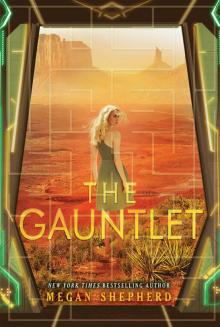 The Gauntlet
The Gauntlet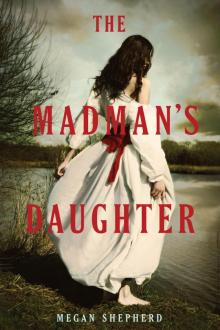 The Madmans Daughter
The Madmans Daughter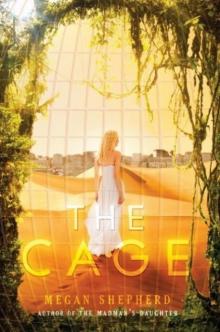 The Cage
The Cage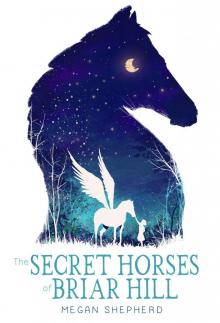 The Secret Horses of Briar Hill
The Secret Horses of Briar Hill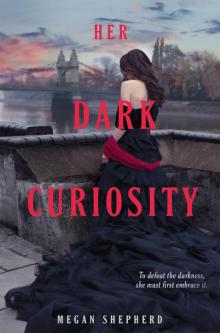 Her Dark Curiosity
Her Dark Curiosity The Hunt
The Hunt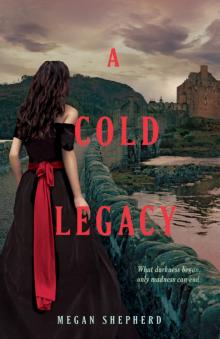 A Cold Legacy
A Cold Legacy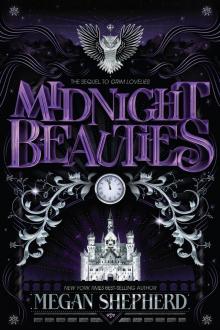 Midnight Beauties
Midnight Beauties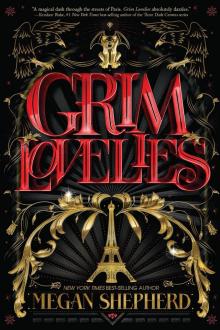 Grim Lovelies
Grim Lovelies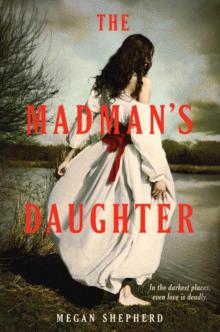 The Madman's Daughter (Madman's Daughter - Trilogy)
The Madman's Daughter (Madman's Daughter - Trilogy)